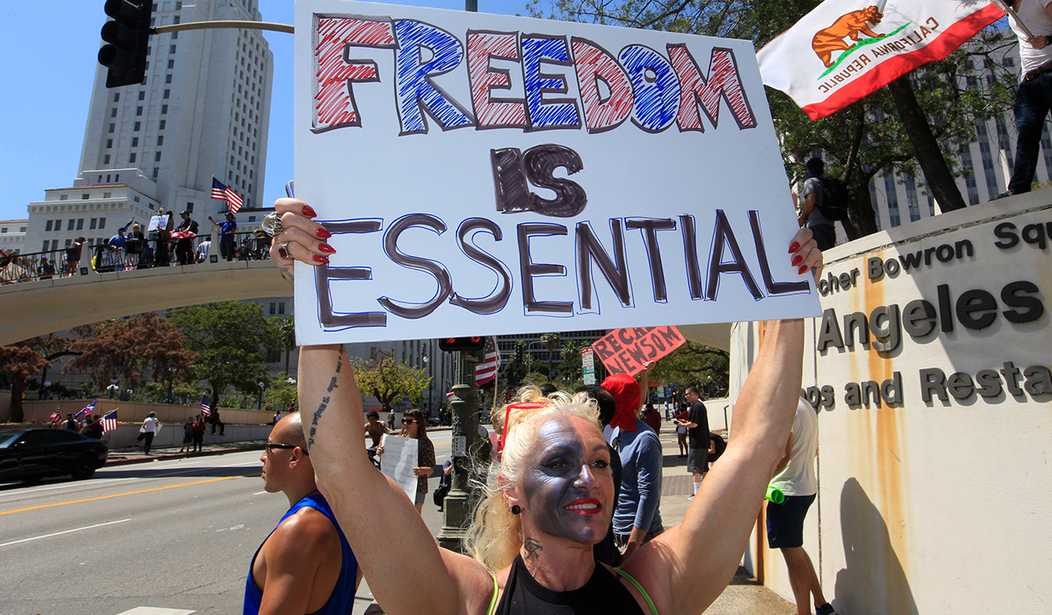As of this writing, more than 80,000 Americans have contracted and died from the coronavirus. But how many have or will die from what some call “despair”?
Consider the following call to my radio show:
Hi, Larry. I was calling about people who have called suicide hotlines and different things with this loss of income. I am a widow of somebody who did commit suicide because of income. It was not now, during the epidemic, but it was because of dwindling income and hopelessness, which he hid from me. I had no idea this was going on in his business life. And I came home from work one day and found him hanging in the garage. He did leave a note about the different debts and things like that, but financial problems are a horrible thing — just a horrible thing that’s worse than the virus.
No doubt going back to work increases a person’s chances of exposure to the COVID-19 virus. More will contract the virus and die from it than would have been the case under continued lockdowns. But this, of course, is not the full picture.
A new report, “Projected Deaths of Despair During the Coronavirus Recession,” suggests as many as 75,000 Americans could die from “despair” due to unemployment, depression from isolation, and fear of the indefinite and uncertain nature of the pandemic. One of the study’s authors, Benjamin Miller, chief strategy officer for Well Being Trust in Oakland, California, said: “Deaths of despair are tied to multiple factors, like unemployment, fear and dread, and isolation. Prior to the COVID-19 pandemic, there was already an unprecedented number of deaths of despair. We wanted to estimate how this pandemic would change that number moving forward.” The study estimates that there could be 75,000 coronavirus-related “deaths of despair” from drug or alcohol abuse and suicide. Miller explained, “The isolation is causing people to lose boundaries on their behaviors. … People have to be working and we have to get people connected to other people.”
About the study, Dr. Elie Aoun, vice chairman of the American Psychiatric Association’s Council on Addiction Psychiatry, said: “I’ve been seeing this in practices and my colleagues have been talking about it, too. … Addiction patients are relapsing, and a lot of patients who don’t have drug use or alcohol problems are drinking more now, sometimes every day from 4 or 5 p.m., and they don’t stop until they sleep.”
Earlier this year, I wrote about the connection between suicide and unemployment. A British journal, The Lancet Psychiatry, published a study associating worldwide suicides to unemployment. “Our findings reveal that the suicide rate increases six months before a rise in unemployment,” said study author Carlos Nordt. “Our data suggest that not all job losses necessarily have an equal impact, as the effect on suicide risk appears to be stronger in countries where being out of work is uncommon.” The study said that between 2000 and 2011, there were an estimated 233,000 suicides in 63 countries and that the number increased during the last recession: “While the number of unemployment-related suicides increased by about 5,000 during the recent economic crisis in 2008, this analysis shows the risk of suicide among jobless people is high even in good economic times.”
Unemployment stands at 14.7%, with over 20 million Americans in April filing for unemployment. The number of unemployed Americans is likely understated. Betsey Stevenson, a former member of the Council of Economic Advisers as well as the chief economist of the U.S. Department of Labor, says due to an incorrect classification of “people who were employed (but) absent from work due to COVID-related reasons as temporarily unemployed,” the actual number of unemployed is likely over 20%.
A new ESPN documentary about the Chicago Bulls’ last championship season describes how Michael Jordan broke his foot early in his pro career, during the third game of the 1985-86 season. Defying his doctors’ expectations, the foot healed faster than expected, and Jordan itched to return to the court despite team owner Jerry Reinsdorf’s fear not only that Jordan could reinjure the foot but that such a reinjury could end his career. Reinsdorf said to Jordan, “If you had a terrible headache, and I gave you a bottle of pills, and nine of the pills would cure you and one of the pills would kill you, would you take a pill?” Jordan responded, “It depends on how bad the f—ing headache is.”
America’s economic headache from the coronavirus stay-at-home orders is f—ing bad.
Larry Elder is a bestselling author and nationally syndicated radio talk show host. His latest book, “The New Trump Standard,” is available in paperback from Amazon.comand for Nook, Kindle, iBooks and GooglePlay. To find out more about Larry Elder, or become an “Elderado,” visit www.LarryElder.com. Follow Larry on Twitter @LarryElder.
Editor’s Note: Want to support PJ Media so we can keep telling the truth about China and the virus they unleashed on the world? Join PJ Media VIP and use the promo code WUHAN to get 25% off your VIP membership.









Join the conversation as a VIP Member